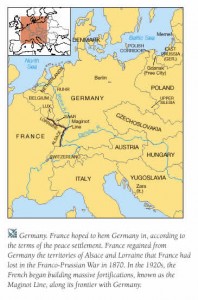ECONOMIC PROBLEMS (INFLATION)
- Instead of taxing its people to finance WWI, Germany had borrowed the money. Thus it had burdened its citizens with a huge debt. To payoff this debt after the war, the German government simply printed more money. This was done even though the country’s industry, agriculture, and commerce were not expanding because of the heavy reparations that had to be paid. Instead of German wealth going
 back to the economy, it went to pay off the war debt. The rapid printing of marks (the basic unit of German currency) unsupported by real economic value caused severe inflation.
back to the economy, it went to pay off the war debt. The rapid printing of marks (the basic unit of German currency) unsupported by real economic value caused severe inflation. - In the spring of 1922, about 300 marks could buy an American dollar. By early 1923, it took 50 000 marks to buy an American dollar. Soon Germans needed billions of marks to pay a postage stamp; it took a shopping bag to marks to get on a streetcar.
POLITICAL INSTABILITY
Nazi
The government should be run by the army and the wealthy. The power of the Military should be increased democratic government should be outlawed. The activities of Jews and foreigners should be severely restricted. (Since the Nazis believed that these two groups were Responsible for Germany’s Economic problems)
Social Democrats
The believed government should be run by elected representatives from all parties. A few key Industries, such as railroads, should be owned by the government. The Terms of the Treaty of Versailles should be honored.
Communists
Believe government should be run by the councils of workers; industries and agriculture should be owned by the government rather than private individuals. Military power should be reduced; workers should be powerful and protected.
- After WW1 Germany was split up into more than a dozen major political parties each with its separate agendas. No party was strong enough to undertake the gigantic task of rebuilding a war-torn country. The main political parties fell into three general groups.
The Treaty of Versailles
- The people of Germany were humiliated by harsh of the treaty. They considered the new boundaries and reparation payments to be unjust. The war guilt clause was seen as a black stain of the honor of all Germans.
Depression and Unemployment
- In the U.S. in 1929 the stock market crashed, marking the beginning of 3 worldwide depression. The shock waves hit Germany full force. Germany depended upon money from abroad. Germany exported manufactured goods and borrowed heavily from the U.S. to pay war reparations. Because of failing businesses everywhere, banks in Germany closed, unable to meet the demands of their depositors.
- Unemployment grew in Germany. Those Germans who still had jobs saw their scanty wages fall steadily from month to month.


thanks for the useful info